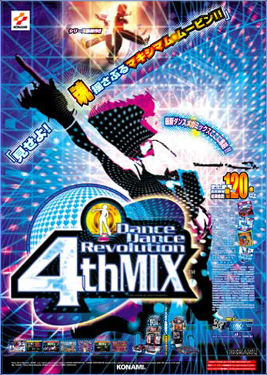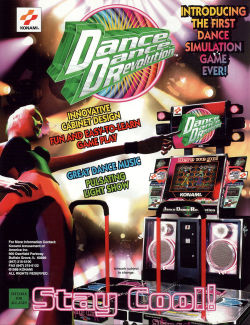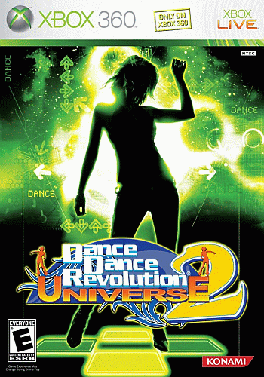Dance Dance Revolution (DDR) is a music video game series produced by Konami. Introduced in Japan in 1998 as part of the Bemani series, and released in North America and Europe in 1999, Dance Dance Revolution is the pioneering series of the rhythm and dance genre in video games. Players stand on a "dance platform" or stage and hit colored arrows laid out in a cross with their feet to musical and visual cues. Players are judged by how well they time their dance to the patterns presented to them and are allowed to choose more music to play to if they receive a passing score.
Dancing Stage is a series of music video games developed and published by Konami. It is a spin-off of Dance Dance Revolution for the European market as well as a few Japanese titles. Games were released for arcade, PlayStation, PlayStation 2 and Wii.
Dream was a Japanese pop girl group. The group was formed as a result of a 1999 talent contest called "Avex Dream 2000". Originally a three-piece group consisting of Mai Matsumuro, Kana Tachibana, and Yu Hasebe, the group has undergone many changes since its debut in 2000 on the Avex Trax label, and none of the original trio remain. The original trio sold over 950,700 records, and in total the group has sold over 1,100,000 records over the span of 10 years.
Riyu Kosaka is a Japanese pop singer and lyricist. She is best known as a member of the Konami-produced Japanese teen pop girl group BeForU.
Yoma Komatsu is a Japanese pop singer. She is the eldest member of the Konami-produced J-Pop group BeForU.

Dance Dance Revolution 4thMix is the fourth game in the main Dance Dance Revolution series of music video games. It was released as an arcade game by Konami on August 24, 2000, in Japan. 4thMix features 136 songs, of which 37 are new songs available and 12 are new unlockables that require an operator code. Dance Dance Revolution 4thMix Plus is an update that unlocks these 12 songs without an operator code, while also adding 14 new songs of its own, for a total of 150 songs.

Dance Dance Revolution (DDR) is a music video game, developed by Konami, released in arcades on November 18, 1998, in Japan. Dance Dance Revolution is a unique game involving dance and rhythm that defined the genre. It involves timing and balance by having players use their feet instead of their hands like typical video games. In March 1999, the game was released for North American arcades, and for European arcades under the name Dancing Stage. Players and game critics were caught off-guard by the game's addictive qualities winning the new franchise many merits to its design.

Dance Dance Revolution SuperNova, released in Europe as Dancing Stage SuperNova is an arcade and PlayStation 2 game in the Dance Dance Revolution (DDR) series of music video games. It was produced by Konami and released through Betson Enterprises. The game was released in Europe on April 28, 2006, followed shortly by a North American release in May and a Japanese release on July 12.

Dance Dance Revolution Universe 2, sometimes abbreviated as Universe 2, is a music video game for the North American Xbox 360. Published by Konami and developed by Hudson Soft on December 4, 2007, Universe 2 is a sequel to Dance Dance Revolution Universe released earlier the same year. Universe 2 features a large soundtrack with songs ranging from the 1970s to today, new modes of gameplay designed for newcomers including Freestyle Mode which allows players to dance without needing to step on any arrows, Quest Mode where players build a dancing character and travel from location to location in a virtual world facing off against other dancers, and downloadable content through the Xbox Live service. The game was released in Europe with a different set of songs as Dancing Stage Universe 2.

Dance Dance Revolution Extreme is a music video game by Konami and is the eighth release in the main Dance Dance Revolution (DDR) series. It was released on December 25, 2002, for Japanese arcades, on October 9, 2003, for the Japanese PlayStation 2, and on September 21, 2004, for the North American PlayStation 2. This game is the ninth release in North America, but despite having the same name as its Japanese counterpart, its gameplay and soundtrack is significantly different and won the Video Music Awards in 2005 on MTV for Best Video Game Soundtrack.
beatmania IIDX substream is a 1999 music video game which had a different songlist and could be linked to a Dance Dance Revolution machine for simultaneous play. If either the Dance Dance Revolution player or IIDX player made mistakes, the other game became more difficult.

Dance Dance Revolution Solo is a series of games spun off of the main Dance Dance Revolution series. It consists of three arcade releases in Japan. The game mode was also adapted for use in a children's arcade version and two console releases.
Dance Dance Revolution Extreme has a robust soundtrack. It includes many licensed tracks as well as in-house original music that was written and performed by Konami staff.
Dance Dance Revolution X3 is a music video game, and a part of the Dance Dance Revolution series. The arcade version of DDR X3 was revealed by Konami on June 2, 2011. The sequel to Dance Dance Revolution X2, X3 began public beta testing on June 8, 2011. Promotional information for the game revealed the full name for the game, called Dance Dance Revolution X3 VS 2ndMix due to the new "2ndMix" mode in the game. It was released in Japan on November 16, 2011 for dedicated cabinets and November 30, 2011 for upgrade kits, and December 16, 2011 in Asia.

Shangri-La is the eleventh studio album by Japanese rock band Mucc, released on November 28, 2012. It continues the sound used in their previous album Karma, this time with elements of metalcore.
Dance Dance Revolution (DDR) is a music video game, the 14th installment of the Dance Dance Revolution series, and the sequel to Dance Dance Revolution X3 vs. 2ndMix. The game was revealed by Konami on October 24, 2012. Public beta testing commenced on October 26, 2012. It was released in Japan on March 14 and 21, 2013 for dedicated cabinets and upgrade kits, respectively, and in Asia on March 21, 2013. A limited test release occurred at select locations in the United States, beginning on August 4, 2015.
Naoki Maeda is a Japanese composer best known for composing and arranging the music for Konami music video games, including the Dance Dance Revolution and Bemani series.
Dance Dance Revolution A20 is a music video game, the 16th installment of the Dance Dance Revolution arcade series in Japan, and the sequel to Dance Dance Revolution A. The game was released on new, golden cabinets on March 20, 2019, in Japan. A software upgrade for older cabinets for Japan and Asia was released on July 24, 2019, with South Korea receiving a localized release on August 1, 2019, and North America on September 24, 2019. A location test in Europe began on October 7, 2019, and ended on March 16, 2020.






